Local law enforcement agencies, prosecutors and service agencies recently joined together to form The Alliance to Fight Human Trafficking in Southwest Louisiana. Lagniappe columnist Dr. Michael Kurth sat down with representatives of these organizations to learn more about human trafficking in our area and how they intend to approach the problem. This forum will be published in two parts in Lagniappe. The first part deals with preventing human trafficking, and the second part will focus on the emotional and psychological recovery of the victims of human trafficking.
Dr. Michael Kurth: Let me begin by explaining that “human trafficking” is a modern term for slavery. It refers to people being bought and sold as commodities and forced to do their owners’ will. Slavery has been around for thousands of years and remains deeply embedded in many cultures. For example, Saudi Arabia did not formally abolish slavery until 1962, and Mauritania did so just 20 years ago. Thus, in many parts of the world it is met with a shrug of the shoulders or a blind eye.
But in the United States, human trafficking is the exception and not the rule. We fought a bloody civil war to abolish slavery, and the belief that “all men are created equal, and they are endowed by their creator with certain unalienable rights” is the foundation of our legal system. Ironically, this may be one reason many Americans are oblivious to the human trafficking taking place in their communities today.
Gene, Is human trafficking on the rise in Southwest Louisiana?
Gene Pittman: From a statistical standpoint, it is difficult to say, because there is a problem with under-reporting. It is not like theft where someone calls the sheriff’s office to report their car was stolen. With human trafficking the victims — those being trafficked — seldom report it and often deny it, which makes it difficult for law enforcement and prosecutors to determine if they are dealing with a sex crime or human trafficking.
Dr. Michael Kurth: Why do victims deny they are being trafficked?
Gene Pittman: To protect their traffickers. Familial human trafficking is what we’ve seen the most of here so far. That is when family members sell their children to a sex trafficker in return for money, drugs or something else of value. It generally comes to our attention in the form of some other crime or neglect, abuse or what have you. As the Alliance moves forward and as people become more aware and more educated, you’re going to find that we have an increase in all forms of human trafficking, not just child sex trafficking.
Dr. Michael Kurth: Is there a link between human trafficking and pedophilia?
Anthony Celestine: Pedophilia is a disorder where someone desires to engage in sexual activities with a pre-pubescent person.
David Duplechain: As Anthony said, the trafficker may not be a pedophile. It is the customer — the person buying the sex act — who may be a pedophile. The trafficker generally doesn’t care.
Dr. Michael Kurth: As I understand it, human trafficking is a federal offense under the 13th amendment to the constitution which banned slavery, and it requires that the person be compelled or coerced into engaging in sex or some other labor for another person’s gain. On the other hand, laws governing “voluntary” sexual activity such as prostitution and under-age sex are state laws that differ from state to state.
Gene Pittman: Yes, and that can make it difficult to prosecute human trafficking. But I want to reiterate that while human trafficking is significantly under-reported, from the data we do have, human trafficking is on the rise in our community. We are on one of the busiest interstate highways in the country located halfway between two of the largest cities, and we have a growing hospitality industry with our casinos. If you look at the Polaris Project’s map of hot zones for human trafficking, all along the gulf coast is considered a hot spot.
Note: The U.S. Department of Justice website lists the following nationwide statistics:
A total of 2,198 persons were referred to U.S. Attorneys for human trafficking offenses in fiscal year 2020, a 62-percent increase from the 1,360 persons referred in 2011.
The number of persons prosecuted for human trafficking increased from 729 in 2011 to 1,343 in 2020, an 84-percent increase.
The number of persons convicted of a federal human trafficking offense increased from 2011 (464 persons) to 2019 (837 persons), before falling in 2020 (658 persons).
Of the 1,169 defendants charged in U.S. district court with human trafficking offenses in fiscal year 2020:
92 percent were male
63 percent were white
18 percent were black
17 percent were Hispanic
95 percent were U.S. citizens
66 percent had no prior convictions.
Dr. Michael Kurth: What about under-age sex?
Stephen Dwight: In Louisiana, the age of consent for sex is 17. Prosecutors do not have to prove there was force, fraud or coercion if the victim is below the age of consent; it is an automatic charge of human trafficking.
Dr. Michael Kurth: Let’s say a 16-year-old girl is drinking and doing drugs with her boyfriend. She’s out of it, so he calls up some of his friends and says, “come on over if you want a piece of this action.” Is that human trafficking?
Gene Pittman: If the boyfriend tells the girl that if she doesn’t go along, he is going to do something bad to her, like post videos on social media, then you are getting into the realm of human trafficking because the element of force and control is involved.
Stephen Dwight: In Louisiana, sex between minors is not a crime, although under certain conditions it could be prosecuted as statutory rape. Now, if her boyfriend is older, let’s say she’s 15 and he’s 16 and he’s forcing her to have sex with his friends, then yes, that could be considered human trafficking.
Dr. Michael Kurth: What role does social media play in human trafficking?
David Duplechain: It plays a major role. A grown man from anywhere in the country can get on social media and pretend to be a kid and start communicating with your child to build a relationship with them; it’s called “grooming”. Traffickers may mentor their victims to become like proteges.
Dr. Michael Kurth: I recently read of a case in New Jersey where a 29-year-old woman posed as a teenager to enroll in a high school for the apparent purpose of recruiting for sex trafficking, and in another instance, they caught a 21-year-old man who confessed he was paid to enroll in a high school and look for vulnerable girls. His job was to get a girl involved, then leave it to the trafficker.
Gene Pittman: Kids who are constantly on social media are vulnerable to being a victim of just about anything. Human trafficking just happens to be one form. A lot of what Tony Celestine does is to make early interventions to decrease the likelihood of vulnerable kids becoming victims.
Dr. Michael Kurth: What you’re talking about could apply to both drugs and sex trafficking. Is there an overlap? Do people become addicted to drugs, then fall victim to sex trafficking to pay for the drugs?
Ken Henry: Absolutely. There’s a major intersection between drugs and sex trafficking. I remember seeing clients in Los Angeles and about 98 percent of them had gotten into sex trafficking that way. They began experimenting with drugs or got involved with a group that was doing drugs. Even if a victim talks to an agency or someone who gives them a glimpse of hope that makes them want to get out, there’s still that chemical addiction. Those chemicals are going to call them to come back to their addiction. So, the victims are fighting chemicals plus emotional and psychological damage, which creates the Stockholm syndrome
Dr. Michael Kurth: Prostitution has been called “the world’s oldest profession,” so it’s nothing new. Back in the 1950s and ‘60s, every city had its “red light district,” usually on “the other side of the tracks,” meaning the poorer part of town. If one drove by the night spots there they would see “street walkers” or “hookers” plying their trade. It was dangerous work because those looking to hook up were not the most stable characters, plus there was the problem of collecting for one’s services. So, every “lady of the evening” had a “pimp” for protection.
Illegal drugs were also once sold on street corners, but drug deals are now conducted over cell phones, the drop is made at an agreed upon location and the exchange takes about 30 seconds. Have cell phones and social media similarly revolutionized sex trade?
Ken Henry: Absolutely. You seldom see “streetwalkers” today; it’s all done through social media using cell phones and the Internet. At the Alliance we have been urging parents to be aware of what apps their kids have on their phones.
Anthony Celestine: A sex slave is a reusable resource. If one buys drugs, once they are consumed, then they need to buy more. But if one has a stable of young women or men who can meet their quota night after night, the money keeps rolling in.
Dr. Michael Kurth: In economics, that is the difference between a “stock” and a “flow.” A stock is a fixed amount — one goes to the grocery store and stocks up on groceries, then and a week later they must go back and replenish their stock of groceries. A flow is like an oil well that just keeps pumping out oil until it runs dry.
So, let’s say someone being trafficked can bring in $2,000 a week; that’s about $100,000 a year. The value of that flow over 20 years is approximately $2,000,000. If a sex trafficker can build up a “stable” of five sex slaves, they are holding resources worth about $10,000,000. That is a huge incentive for a trafficker to go out and recruit more victims for their stable. That is what parents are up against in the battle to keep their children safe.
Ken Henry: All our prevention is aimed at minors and children. But as far as our client services — who we are dealing with every single day — it’s all 18 and over. We have people in their 40s sometimes.
Gene Pittman: I think there’s a lot less forgiveness for adult victims. Why are you home? Why did you lose your job? You’re a drug addict or alcoholic. People tend to blame the victim.
Note: Most survivors of sex trafficking were recruited between the age of 12 and 20. Those younger than 12 are generally victims of familial trafficking, whereas those in the older age range are often driven by poverty and economic need.
Ken Henry: Social media is important, but you can’t leave out poverty, because poverty creates vulnerability. Many people around the country suffered due to the pandemic, but Southwest Louisiana also suffered two major hurricanes and a flood. A lot of folks around here are suffering, and that is what the human traffickers look for. They come from big cities like Houston or New Orleans to areas like Lake Charles looking to build their “stables.”
Anthony Celestine: I was talking with people at our recent Alliance kick-off breakfast, and they told me they had no idea this was in our backyard. Our job is to take every opportunity to educate individuals and encourage them to learn more about what’s going on, whether it’s a kid in North Lake Charles, Central Lake Charles, Graywood or Moss Bluff. But we must act now.
There is a lot of poverty in our black neighborhoods. If we are serious about fighting this problem, we need to go into the black churches and talk about human trafficking very candidly. So many kids are just told to get right with God, then left out there to deal with this situation on their own. There were very few black folks at the kickoff breakfast. We must be more aggressive addressing this issue in the black community. We need to grab these kids in their schools, their social organizations, or wherever they gather.
And I guarantee you there’s a lot more sex and labor trafficking going on than we are aware of. There is a young Venezuelan lady that we’re trying to help; she has very limited English, but the story she is telling sounds exactly like grooming, and she’s wanting to get away from this guy who brought her here from New York. That’s what traffickers do; they choose a place like Lake Charles because they think they are safe here.
Dr. Michael Kurth: Do you think the heightened awareness and concern about human trafficking is because social media has brought sex-trafficking from “the other side of the tracks” into the more prosperous suburbs?
Ken Henry: Bingo! That is exactly why. As Gene was saying, it’s more sophisticated now. In areas where the kids are not informed or are naive, they are vulnerable.
Stephen Dwight: I think it’s a matter of education. Many people in our community don’t believe there is a problem here because they don’t know what they’re looking for. Employers don’t know what to look for. If they see a girl on the street, they think, oh, that’s a prostitute. They don’t think of it as a trafficking situation. I had a senator call me upset by the number of cases that had been reported to her and how many cases had been prosecuted. I think people don’t know how to identify human trafficking, so they end up prosecuting the people who are really the victims. The work we are doing at the Alliance is to educate the public, stop sex abuse, and advocate for victims.
Anthony Celestine: Most people think a juvenile victim should be arrested for prostitution when they can’t be. They are victims. It’s just a matter of education and understanding. My ninth-grader goes to one of the largest schools in the parish, and some parents in that community are very uninformed and complacent. They allow their children to move around freely with very little supervision. You know, parents need to keep track of their kids.
Gene Pittman: You can’t fight something you’re not aware of, and you can’t solve a problem you don’t even know you have. Our first goal at the Alliance is to make people aware of human trafficking, tell them what they should be looking for, and what to do if they suspect it may be going on.
Dr. Michael Kurth: So, the frontline of the battlefield is parents, teachers and churches?
Anthony Celestine: As citizens, we all have that responsibility. Law enforcement, educators, clergy, anyone who interacts with children. We’ve faced some tough problems in the past — gang violence, drugs, weapons. And one thing that’s true about this community is that it’s very resilient. We will attack problems head on. I don’t see this as being any different. We’re going to come together and work hard. There are pockets of people who are going to say they don’t believe it’s happening, but the majority will fall in line and do their best to try to work on this. And as Ken said, it can’t just be one group, one demographic. It must be everybody. All parents being more active in their kids’ lives, monitoring what they do on social media. You can’t keep your kids from technology, but what they do on their phones and their computers leave footprints. They can look at the history of who they have been communicating with, who has been sending them pictures.
Ken Henry: In task force meetings we emphasize both labor and sex trafficking and we bring in experts to go over actual case studies so everybody in that room can learn to identify such cases. For example, we bring in people from Homeland Security to explain what the situation is with migrants crossing our borders. They’ll tell you that they couldn’t get this person on human trafficking because they sent the money they earned back to their family, which means they must investigate identity theft and money laundering. It can be a very complicated process.
Dr. Michael Kurth: What about using the internet against human traffickers?
Stephen Dwight: We do. There is a whole division and that is really all they do.
Dr. Michael Kurth: Putting out fake notices to lure human traffickers?
Gene Pittman: We participate in the Internet Crimes Against Children Task Force. It is a national network of federal, state and local law enforcement agencies dedicated to investigating and prosecuting internet crimes against children. You’d be surprised how far people will travel to meet a young girl or boy.
Dr. Michael Kurth: When it comes to who is on the frontline in the battle against human trafficking, ideally it is the parents. But the reality is parents often are not up to the task, especially in single-parent homes or families where both parents work. Often a child’s cell phone or the Internet serves as their babysitter, and they have very little interaction with “real” people, especially adults.
David Duplechain: I go out and give awareness presentations, and I talk to people about what you can do to prevent human trafficking. One of the things you can do is be a trusted adult, someone a child can turn to for guidance and or to share their troubles and concerns.
Dr. Michael Kurth: But if a child tells an adult about inappropriate sex, isn’t the adult required to report it to the police?
Stephen Dwight: If a person comes in regular contact with children, even as a volunteer, they are more than likely covered under Louisiana’s Childrens Code and required to report it.
David Duplechain: If you are in that situation and a kid comes to you and hints there is something inappropriate going on in their life, the best thing to do is be honest and upfront about it. Tell them they can tell you anything, but if somebody’s in danger or might be hurt, you may have to report it. Maybe they won’t disclose it right then, but just by being there for them you have started the process. Say to them “you know what, I’ve got some friends that can help you, and I’d like you to talk to them” and then expand the process from there.
Dr. Michael Kurth: I believe that law was the result of several high-profile cases such as Jerry Sandusky, the assistant football coach at Penn State, and the US Olympic Gymnastics Team, where sex abuse was known but went unreported for years because people did not want to report their friend, colleague or boss. These were not isolated cases. It turned out child sex abuse was going unreported or covered-up in many schools, youth organizations and religious organizations to avoid scandals. But requiring “trusted adults” to report it to the police seems to me to be counterproductive.
Gene Pittman: If you look around this table, I picked the folks to be here. We have a collaborative relationship: we know each other by face, and we have each other’s phone numbers. Reporting an inappropriate relationship is not just a matter of calling the police and having them show up at somebody’s door with an arrest warrant in their hands. We are an alliance. We work together as a team. I’ve seen in other parts of the state where there’s almost a war between victim services groups and law enforcement. In Southwest Louisiana, we realize the process needs to be victim-centered, and victim services and advocates understand the frustrations and struggles law enforcement faces in trying to put traffickers away.
Prosecuting sex crimes is very complex. We generally assign our best detectives, interviewers and interrogators to sex crime cases where prosecution relies very heavily on the victim’s testimony. The victim must tell investigators what happened so they can bring the suspects in and confront them with the evidence. Sometimes there is physical or digital evidence such as phones and text messages to corroborate things, but it still comes down to “he said/she said.” What happens to the victim awaiting the trial? There is a lot of pressure on them. Is it revictimization to put them on the stand? And in the end, you still must convince the 12 people in the jury box, and that goes to educating the public because the jurors are from the public.
Stephen Dwight: Often the victim feels personal responsibility for what happens to them. Perhaps they are going to lose their house or their income. We must do our best to show them that we are on their side, and we are here to help them. From the very first time we meet with them we try to establish trust and foster a relationship with victims to ensure that if a case does go to trial, the victim knows we have their best interest in mind and want them to feel comfortable and at peace through the criminal justice process.
Gene Pittman: I told our detectives the other day not to have a pre-determined outcome in mind because often we discover human trafficking while investigating other crimes such as domestic disturbances or child abuse. I said just get everything they think might have value as evidence or testimony or witness statement or victim statements. Then we can meet with the district attorney’s office and determine what crimes we can charge a person with because the victim may try to hide the situation.
Stephen Dwight: A conviction in the trial is not the final goal. We must encourage the victim to take the next step and break out of the situation they are in. That is why the Alliance is so important. It’s not just getting a guilty verdict for their tormentor. It’s about getting them to change their lifestyle and helping them build a better life for themselves.
Dr. Michael Kurth: We have been talking about sex trafficking, but labor trafficking — forcing someone to work against their will — is also a problem. According to the International Labour Organization (ILO) there were an estimated 27 million victims of modern slavery around the globe. Labor trafficking is less common in the United States, with an estimated 10,000 victims, although the actual number could be significantly higher, especially among undocumented immigrants.
A study by the National Institute of Justice found that 71 percent of those experiencing forced labor in the United States were U.S. citizens or had entered the country on lawful H-2A and H-2B visas. The majority work in restaurants, food service and hospitality, with 19 percent working in domestic services and 8 percent in agriculture. Federal government action against labor trafficking has primarily focused on banning products made by forced labor overseas and enforcing labor laws such as affirmative action.
That brings us to the second part of this forum, which will appear in the next issue of Lagniappe. It will cover the emotional damage suffered by the victims of human trafficking and how can they overcome the stigma of their past to become productive members of society.




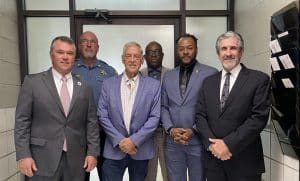
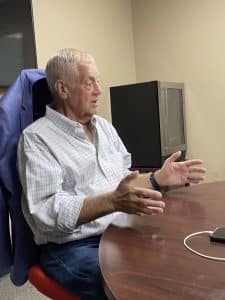
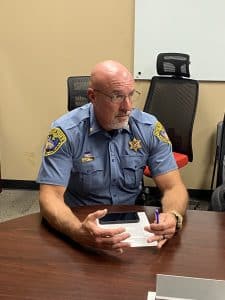
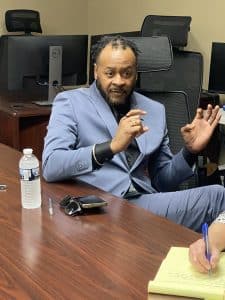
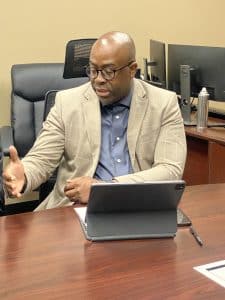
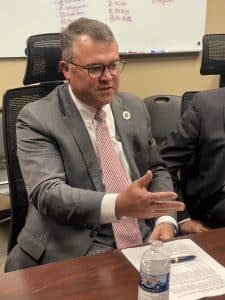
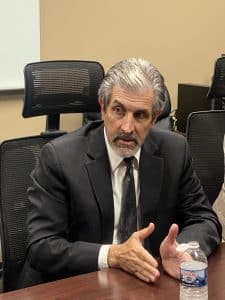












Comments are closed.